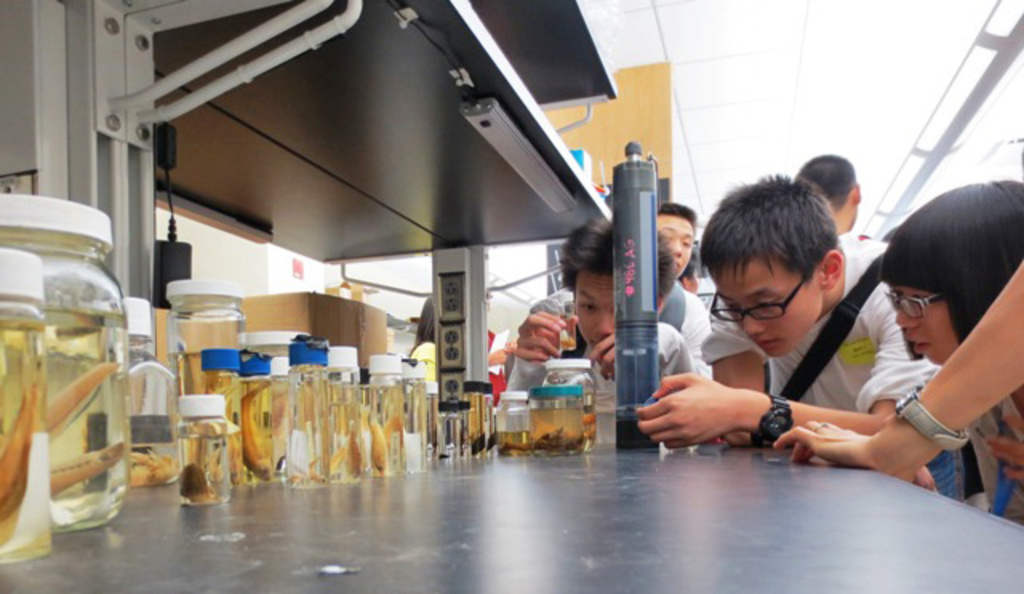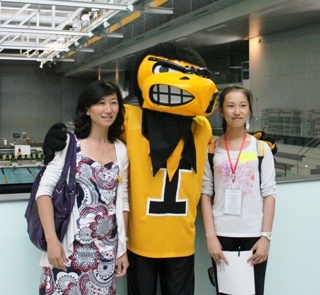
After a 12-hour train ride, three planes, and two full days of travel, an exhausted Xiaowei Zhu, who goes by Ashley, finally arrived in Chicago and joined her group to embark on a two-week tour of the Mississippi River and its surrounding areas.
Zhu, from Jianxi Province in southeast China, is one of 60 outstanding Chinese high school students selected to participate in the unique Rivers as Bridges program, sponsored by the Environment and Public Health Network for Chinese Students and Scholars (ENCSS).
Rivers as Bridges is a sister-river exchange program with the goal of connecting the youth of the Mississippi and Yangtze River areas and promoting environmental conservation practices and cultural interaction. This marks the second year of the program, a 10-year initiative by ENCSS that will culminate in the 50th anniversary celebration of the Shanghai Accord in 2020.
Students on the program get hands-on experience in biology, agriculture, land and water use, and conservation science—not to mention a crash-course in American culture. At the end of their two weeks, the students will give presentations on one of 11 topics and earn a one-hour credit from Northland Pines High School in Eagle River, Wis.

Although not part of last year’s pilot program, vice-president and curriculum designer Jack Palmer says the group has a strong relationship with the University of Iowa and it seemed like a natural addition to this year’s itinerary.
On July 23, the students started their day in Iowa City bright and early with a tightly scheduled itinerary ahead of them.
After a presentation by Ying Xu, the UI’s assistant director of China recruitment and Asian initiatives in the Office of Admissions, the group split into three sections for campus tours. Next they were off to the Oakdale campus to explore the State Hygienic Lab at the UI and the Hydraulic Wave Basin Facility.
Jisen Ren, a quiet, but eager student from Shaanxi province, hopes this trip helps him to gain a new international perspective. For many students, this program is their first experience in education outside the Chinese classroom setting. Rivers as Bridges gives high school students a rare opportunity to travel abroad and get exposed to the idea of learning as a dynamic experience that takes place in hands-on labs, museums, and through conversations with the right people.
“The modern world is changing rapidly, and I have never been abroad before. I want to improve my English, but also be aware of the world more and broaden my horizons,” says Ren.
Making connections is at the heart of Rivers as Bridges. Palmer explains that leadership is one of the key requirements for participation in this competitive program. Students are recommended by their school principals and selected based on their academic prowess, interest in natural resources and conservation, and demonstrated leadership skills.
“We are really trying to promote future leadership,” Palmer says. “This is about facilitating connections for these students that they can use and build on in the future.”
Most of the students who visited the UI campus are sophomores and juniors who are beginning to plan for their future education. Several students attend international high schools in China, where they are already preparing for their SATs and the Test Of English as a Foreign Language exams, also commonly known as TOEFL. For them, the question is not if they should go abroad, but simply which U.S. university to choose.
As well as earning American high school credit, which will help make students’ applications more competitive, Rivers as Bridges offers them an opportunity to tour some of the Midwest’s educational establishments.
Xiaodong Kuang, Rivers as Bridges president and an assistant professor at University of Wisconsin-Eau Claire, says one of the goals of the program is to introduce young Chinese students to the Midwest, a part of the United States many Chinese students may overlook in favor of well-known coastal cities.
“I came to see what an American university was like,” says 16-year old Yu Guo. She is bright, articulate, and interested in biology but wants to keep an “open mind” regarding her studies.
“I have hoped to come to the U.S. for college since I was very young,” she says. “It has always been my dream but it is good for me to learn now about some of the differences between us. I already see so many—the green campus, the teaching style, everything.”
UI International Programs Dean Downing Thomas says the program is a wonderful opportunity to build on people-to-people connections through educational and cultural exchange.
“We are delighted to have the opportunity to open the minds of gifted, young Chinese students to the possibilities offered by a world-class research university," Thomas says. "Our program builds on ties between Iowa and China that have developed over the years, most recently the visit by President Xi Jinping to Muscatine."
And Muscatine is just where this group is headed. On July 24, the students make their next stop at the Lucille A. Carver Mississippi Riverside Environmental Research Station (LACMRERS), operated by the UI College of Engineering.
To learn more about the Rivers as Bridges program and view the full itinerary of the 2013 tour, visit their website.
In March 2013, Rivers as Bridges sent their first pilot group of American high school and college students to China. Read an interview with two University of Iowa participants here.